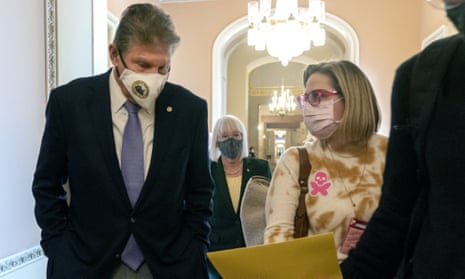This week, the spotlight once again will be on Democratic senators Joe Manchin and Kyrsten Sinema (dubbed “Manchinema” by the Washington press corps when the two blocked much of Biden’s agenda).
Which is exactly where both of these politicians want it.
It’s the Democrats’ last chance for a large package – Manchin agreed last week to $790bn – on the climate and healthcare, financed by a tax increase on the rich and big corporations. But will Sinema go along?
It’s been joked that the word “politics” is derived from the Latin “poli”, meaning “many”, and “ticks”, meaning small blood-sucking insects. I don’t hold such a cynical view. But I do know from 50 years’ experience in and around Washington that most of the people who serve in our nation’s capital have very, very large – shall we say? – egos.
On Sunday, Manchin made the rounds of all five Sunday morning talkshows. He thereby achieved what’s known as a “full Ginsburg”, after William Ginsburg, the lawyer for Monica Lewinsky, who was the first to appear on all Sunday talkshows, on 1 February 1998.
Manchin treated it as a victory lap. He took credit for his newly named “Inflation Reduction Act”. (He refused to allow it to be named “Build Back Better” because he’s still smarting over what he viewed as the Biden administration’s criticism of him for blocking the original BBB.)
When Manchin was asked by the Meet the Press host, Chuck Todd, whether he wanted Democrats to keep control of the House and Senate after the midterms, Manchin declined to answer. (Does he want to hold out the possibility of becoming a Republican kingmaker if the Dems lose?)
Tellingly, Manchin wouldn’t even use the pronoun “we” when talking about the Democrats.
I’ve always made it a point to listen to the pronouns politicians use. The use of pronouns tells you a lot about a politician’s loyalties. Manchin almost never uses “we” when he refers to Democrats. Sometimes, it’s “they”. When Trump was president, he used “we” to refer to the people who voted for him, and “they” for everyone else.
Which brings me to Kyrsten Sinema – who uses the pronoun “I” perhaps more frequently than any other contemporary politician. (“I’m always surprised when people say, ‘Oh, she’s an enigma,’” said Sinema in an interview with the Washington Post. “I’m, like, not at all, actually. I’m very straightforward about what I believe in and why I’m doing what I do.”)
Yet Sinema appears to be absent when it comes to moral principle. Although not up for re-election until 2024, she is one of the Senate’s major recipients of Wall Street cash. The finance industry has donated $2.2m to her since she took office in 2017.
Sinema has obliged by, among other things, refusing to close the so-called “carried interest” tax loophole that mostly benefits private-equity investors and hedge fund managers by treating their pay as capital gains (at a tax rate of 24%) rather than as ordinary income (37%) – even though their pay is ordinary income, since they risk none of their own capital.
By contrast, Manchin wants to close the loophole – or nearly so. (Manchin’s bill would lengthen the amount of time private-equity and hedge-fund managers must hold their investments to qualify them for capital gains.)
“The only thing I was adamant about was the carried interest,” Manchin told reporters last Thursday. Manchin’s aversion to the loophole isn’t new. Last year he joined two other Senate Democrats in sponsoring a bill to close it.
Closing the carried-interest loophole is the only tax increase on rich individuals in Manchin’s compromise bill. The rest of the tax hikes are on corporations.
The carried-interest loophole is a blatant giveaway to the super-rich. It has no redeeming social value. Even Trump promised to eliminate it, as did Barack Obama and Joe Biden.
Yet carried interest is still in the tax code. That’s because lobbyists for the private-equity and hedge fund industries care about little else and pour lots of money into the campaigns of both Democratic and Republican members of Congress to maintain it. (The Democratic House ways and means committee chair, Richard Neal, is a powerful supporter of the loophole. The private equity industry is one of Neal’s biggest donors.)
Sinema’s office says she’s still reviewing Manchin’s bill. How long will Democrats have to wait until she breaks her silence on it?
If there’s one thing Sinema loves more than Wall Street dollars, it’s national media attention. So it could be a while.
Robert Reich, a former US secretary of labor, is professor of public policy at the University of California at Berkeley and the author of Saving Capitalism: For the Many, Not the Few and The Common Good. His new book, The System: Who Rigged It, How We Fix It, is out now. He is a Guardian US columnist. His newsletter is at robertreich.substack.com

